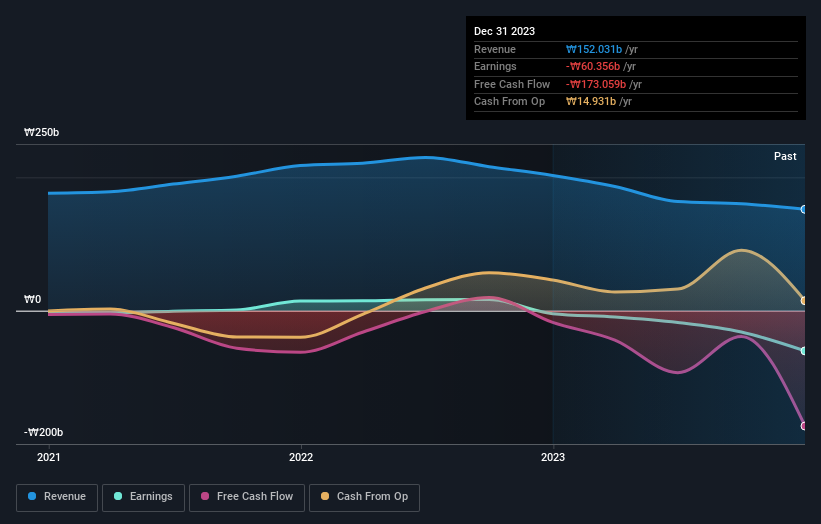Stock Analysis
- South Korea
- /
- Chemicals
- /
- KOSE:A001570
Kumyang Co., Ltd.'s (KRX:001570) 3.5% gain last week benefited both retail investors who own 57% as well as insiders

Key Insights
- The considerable ownership by retail investors in Kumyang indicates that they collectively have a greater say in management and business strategy
- A total of 25 investors have a majority stake in the company with 43% ownership
- Insider ownership in Kumyang is 36%
Every investor in Kumyang Co., Ltd. (KRX:001570) should be aware of the most powerful shareholder groups. We can see that retail investors own the lion's share in the company with 57% ownership. That is, the group stands to benefit the most if the stock rises (or lose the most if there is a downturn).
Retail investors gained the most after market cap touched ₩5.5t last week, while insiders who own 36% also benefitted.
Let's take a closer look to see what the different types of shareholders can tell us about Kumyang.
Check out our latest analysis for Kumyang

What Does The Institutional Ownership Tell Us About Kumyang?
Institutional investors commonly compare their own returns to the returns of a commonly followed index. So they generally do consider buying larger companies that are included in the relevant benchmark index.
We can see that Kumyang does have institutional investors; and they hold a good portion of the company's stock. This can indicate that the company has a certain degree of credibility in the investment community. However, it is best to be wary of relying on the supposed validation that comes with institutional investors. They too, get it wrong sometimes. It is not uncommon to see a big share price drop if two large institutional investors try to sell out of a stock at the same time. So it is worth checking the past earnings trajectory of Kumyang, (below). Of course, keep in mind that there are other factors to consider, too.

We note that hedge funds don't have a meaningful investment in Kumyang. The company's CEO Kwang-Jy Ryu is the largest shareholder with 36% of shares outstanding. With 2.1% and 1.8% of the shares outstanding respectively, The Vanguard Group, Inc. and BlackRock, Inc. are the second and third largest shareholders.
Our studies suggest that the top 25 shareholders collectively control less than half of the company's shares, meaning that the company's shares are widely disseminated and there is no dominant shareholder.
While it makes sense to study institutional ownership data for a company, it also makes sense to study analyst sentiments to know which way the wind is blowing. Our information suggests that there isn't any analyst coverage of the stock, so it is probably little known.
Insider Ownership Of Kumyang
The definition of an insider can differ slightly between different countries, but members of the board of directors always count. Management ultimately answers to the board. However, it is not uncommon for managers to be executive board members, especially if they are a founder or the CEO.
I generally consider insider ownership to be a good thing. However, on some occasions it makes it more difficult for other shareholders to hold the board accountable for decisions.
Our information suggests that insiders maintain a significant holding in Kumyang Co., Ltd.. It has a market capitalization of just ₩5.5t, and insiders have ₩2.0t worth of shares in their own names. That's quite significant. Most would say this shows a good degree of alignment with shareholders, especially in a company of this size. You can click here to see if those insiders have been buying or selling.
General Public Ownership
The general public -- including retail investors -- own 57% of Kumyang. This size of ownership gives investors from the general public some collective power. They can and probably do influence decisions on executive compensation, dividend policies and proposed business acquisitions.
Next Steps:
While it is well worth considering the different groups that own a company, there are other factors that are even more important. Like risks, for instance. Every company has them, and we've spotted 4 warning signs for Kumyang (of which 2 make us uncomfortable!) you should know about.
Of course, you might find a fantastic investment by looking elsewhere. So take a peek at this free list of interesting companies.
NB: Figures in this article are calculated using data from the last twelve months, which refer to the 12-month period ending on the last date of the month the financial statement is dated. This may not be consistent with full year annual report figures.
Valuation is complex, but we're helping make it simple.
Find out whether Kumyang is potentially over or undervalued by checking out our comprehensive analysis, which includes fair value estimates, risks and warnings, dividends, insider transactions and financial health.
View the Free AnalysisHave feedback on this article? Concerned about the content? Get in touch with us directly. Alternatively, email editorial-team (at) simplywallst.com.
This article by Simply Wall St is general in nature. We provide commentary based on historical data and analyst forecasts only using an unbiased methodology and our articles are not intended to be financial advice. It does not constitute a recommendation to buy or sell any stock, and does not take account of your objectives, or your financial situation. We aim to bring you long-term focused analysis driven by fundamental data. Note that our analysis may not factor in the latest price-sensitive company announcements or qualitative material. Simply Wall St has no position in any stocks mentioned.
About KOSE:A001570
Worrying balance sheet with weak fundamentals.


